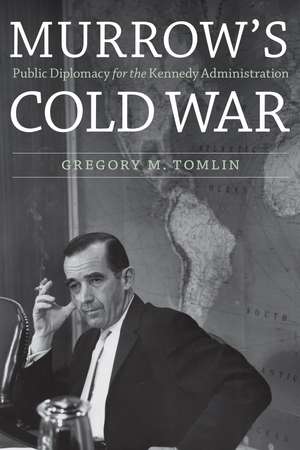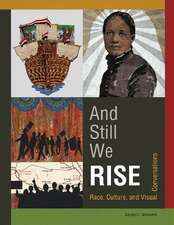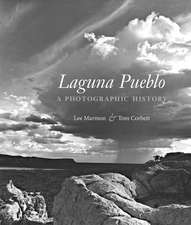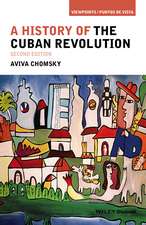Murrow's Cold War: Public Diplomacy for the Kennedy Administration
Autor Gregory M. Tomlinen Limba Engleză Hardback – 30 apr 2016
In March 1961 America’s most prominent journalist, Edward R. Murrow, ended a quarter-century career with the Columbia Broadcasting System to join the administration of John F. Kennedy as director of the United States Information Agency (USIA). Charged with promoting a positive image abroad, the agency sponsored overseas research programs, produced documentaries, and operated the Voice of America to spread the country’s influence throughout the world. As director of the USIA, Murrow hired African Americans for top spots in the agency and leveraged his celebrity status at home to challenge all Americans to correct the scourge of domestic racism that discouraged developing countries, viewed as strategic assets, from aligning with the West.
Using both overt and covert propaganda programs, Murrow forged a positive public image for Kennedy administration policies in an unsettled era that included the rise of the Berlin Wall, the Cuban Missile Crisis, and support for Vietnam’s Ngo Dinh Diem. Murrow’s Cold War tackles an understudied portion of Murrow’s life, reveals how one of America’s most revered journalists improved the global perception of the United States, and exposes the importance of public diplomacy in the advancement of U.S. foreign policy.
Using both overt and covert propaganda programs, Murrow forged a positive public image for Kennedy administration policies in an unsettled era that included the rise of the Berlin Wall, the Cuban Missile Crisis, and support for Vietnam’s Ngo Dinh Diem. Murrow’s Cold War tackles an understudied portion of Murrow’s life, reveals how one of America’s most revered journalists improved the global perception of the United States, and exposes the importance of public diplomacy in the advancement of U.S. foreign policy.
Preț: 211.37 lei
Nou
Puncte Express: 317
Preț estimativ în valută:
40.45€ • 42.53$ • 33.42£
40.45€ • 42.53$ • 33.42£
Carte disponibilă
Livrare economică 27 martie-10 aprilie
Preluare comenzi: 021 569.72.76
Specificații
ISBN-13: 9781612347714
ISBN-10: 1612347711
Pagini: 400
Ilustrații: 12 illustrations, index
Dimensiuni: 152 x 229 x 36 mm
Greutate: 0.71 kg
Editura: Potomac Books Inc
Colecția Potomac Books
Locul publicării:United States
ISBN-10: 1612347711
Pagini: 400
Ilustrații: 12 illustrations, index
Dimensiuni: 152 x 229 x 36 mm
Greutate: 0.71 kg
Editura: Potomac Books Inc
Colecția Potomac Books
Locul publicării:United States
Notă biografică
Gregory M. Tomlin was as an assistant professor of history at the United States Military Academy at West Point. A career army officer, he has served in Germany, Korea, Kosovo, and Iraq, as well as at the White House as a military social aide for the Obama administration. Tomlin is the coauthor of The Gods of Diyala: Transfer of Command in Iraq.
Cuprins
List of Illustrations
Acknowledgments
Introduction: Public Diplomacy for a New Frontier
List of Abbreviations
1. Good Night, CBS
2. 1776 Pennsylvania Avenue
3. From Fiasco to Progress in Latin America
4. This . . . Is Berlin
5. Mr. Murrow Goes to Hollywood
6. The USIA and the Cuban Missile Crisis
7. Advocates for a Test Ban
8. Birmingham, the Story Heard ’Round the World
9. Counterinsurgency Propaganda in Southeast Asia
10. Good Luck, Ed
Notes
Bibliography
Index
Acknowledgments
Introduction: Public Diplomacy for a New Frontier
List of Abbreviations
1. Good Night, CBS
2. 1776 Pennsylvania Avenue
3. From Fiasco to Progress in Latin America
4. This . . . Is Berlin
5. Mr. Murrow Goes to Hollywood
6. The USIA and the Cuban Missile Crisis
7. Advocates for a Test Ban
8. Birmingham, the Story Heard ’Round the World
9. Counterinsurgency Propaganda in Southeast Asia
10. Good Luck, Ed
Notes
Bibliography
Index
Recenzii
"For readers who admire Murrow for his reporting from Britain during the Blitz of World War II, for his stand against McCarthyism, or for his overall journalistic work, Tomlin’s book adds a dimension to an often underrated part of Murrow's career."—Philip Seib, American Historical Review
"Well-written and carefully crafted."—Laura A Belmonte, Diplomatic History
"Tomlin's study provides a highly readable, well-documented, and cogently argued account of those long-gone, golden years of U.S. public diplomacy."—Frank Schumacher, Journal of Cold War Studies
“Up to this point, we have had Murrow the legendary journalist. Now, with Gregory Tomlin’s new and important work, we also have Murrow the reluctant Cold War bureaucrat. The contrast is bracing. Tomlin has added valuable insights into one of the founders of broadcast journalism, and his book is both fun and informative.”—Marvin Kalb, Edward R. Murrow Professor of Practice, Emeritus, at Harvard Kennedy School and one of Murrow’s former colleagues at CBS
“Working with insight and a hawk eye for archival detail, Gregory Tomlin has written a first-class account of one of the central figures in the evolution of U.S. public diplomacy: Edward R. Murrow. At a time when the United States government is once again pondering the best way to engage global opinion, it is invaluable to be able to look back on the virtues (and a few vices) of the approach taken fifty years ago by the legendary broadcast journalist in the service of a remarkable administration.”—Nicholas J. Cull, author of The Cold War and the United States Information Agency: American Propaganda and Public Diplomacy, 1945–1989










